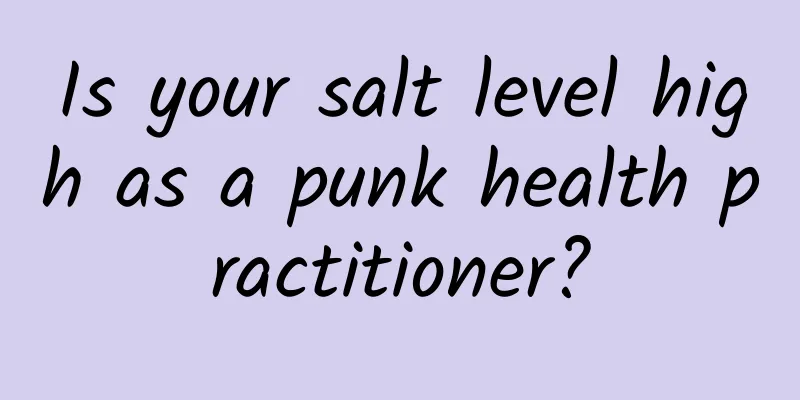Is your salt level high as a punk health practitioner?

|
Author: Gong Weiyan, Associate Researcher, Institute of Nutrition and Health, Chinese Center for Disease Control and Prevention Reviewer: Liu Ailing, Researcher, Institute of Nutrition and Health, Chinese Center for Disease Control and Prevention In recent years, many young people have begun to pursue "punk health care", staying up late to apply facial masks, drinking hot pot with herbal tea, adding Codonopsis pilosula to cola, adding wolfberry to beer, drinking more water due to high salt intake... This high-energy and low-energy health care method seems twisted, but it truly reflects the contradictory and complex mentality of young people - they want to do whatever they want, but they also want to be healthy. In the left hand, there are donkey-hide gelatin, bird's nest, cordyceps flower, red dates and wolfberry health tea, and in the right hand, there are hamburgers, French fries, fried chicken legs, spicy sticks, ice cream cones and happy water. Little do you know that you who "keep healthy" may have "high salt value" without knowing it. "High salt value" means excessive salt, which can lead to many diseases, such as osteoporosis, hypertension, gastric cancer, etc. Figure 1 Copyright image, no permission to reprint The "China Cardiovascular Health and Disease Report 2021" shows that hypertension is a major risk factor for many cardiovascular diseases, and its prevalence is increasing. The number of people with hypertension in my country has reached nearly 245 million. In recent years, cardiovascular and cerebrovascular diseases such as hypertension have shown a trend of "younger age and more frequent occurrence"... Figure 2 Copyright image, no permission to reprint The following signs indicate that you may have a high salt level. • Dry mouth, always thirsty. If you take in too much salt, the ratio of salt and water in your body will be unbalanced. In order to maintain the balance of the internal environment, the increase in plasma osmotic pressure will stimulate the thirst center and osmotic pressure receptors in the hypothalamus, causing reflex thirst. • Slowed reaction. Excessive salt intake can easily lead to dehydration. Once a person is dehydrated, the brain's cognitive function, attention, memory and comprehension will decline, and the reaction will slow down. Researchers have found that excessive salt intake can easily lead to degenerative changes in the nervous system and may increase the risk of Alzheimer's disease. • Fingers become thicker and feet become fatter. The main component of salt is sodium chloride. Long-term excessive intake of sodium will lead to water retention. The typical symptoms are thicker fingers, swollen ankles and insteps, and swollen calves, which reduces your "appearance". • Headaches. Too much sodium in the body can make people more susceptible to headaches. Studies have shown that reducing sodium intake can significantly reduce the risk of headaches. • Always want to urinate. When the body takes in too much sodium, the kidneys will work overtime to excrete the excess sodium from the body, which will cause an increase in urine volume. Since "high salt value" can be harmful to health, how can you, who are into "punk health", lower your "salt value" and maintain "good looks"? You need the following "punk health" guide to lowering your "salt value". 1. Make good use of natural spices and use less "high-salt" condiments . When cooking "punk health" dishes, you may wish to use natural spices such as onions, ginger, garlic, pepper, star anise, coriander, and mushrooms to add flavor and seasoning, and use less salt, as well as "high-salt" condiments such as soy sauce, MSG, salad dressing, meat tenderizer, and ketchup. Figure 3 Copyright image, no permission to reprint 2. Use salt-limiting tools to limit your daily salt intake to no more than 5 grams . Use salt-limiting spoons, salt shakers and other tools to control your daily salt intake. For healthy adults, the daily salt intake should not exceed 5 grams. Figure 4 Copyright image, no permission to reprint 3. Use low-sodium products with light colors and light taste . If you do not have hyperkalemia and renal insufficiency, you can use low-sodium salt instead of ordinary salt. Use low-salt soy sauce, low-salt soy sauce, light-salt soy sauce, light-salt soy sauce and other condiments with low sodium content instead of "high-salt value" condiments. Figure 5 Copyright image, no permission to reprint It should be noted that the total amount of these condiments still needs to be controlled, and it is not the case that just using "low-salt" condiments will be all right. Figure 6 Copyrighted images are not authorized for reproduction 4. Add salt before serving, less salt for the same saltiness . Add salt when the dish is 90% cooked, before serving, or when turning off the heat, and you can reduce the amount of salt while maintaining the same saltiness. Figure 7 Copyright image is not authorized for reproduction 5. Choose more fresh ingredients and less processed foods with "high salt value" . Most foods have salt added during the processing process. Try to buy fresh ingredients and choose less processed foods. Figure 8 Copyright image, no permission to reprint 6. Stay away from "high-salt" snacks. Not salty does not mean no salt . Some foods, such as biscuits, bread, nuts, preserved fruits, ice cream cones, etc., do not taste salty or even a little sweet, but in fact, their "salt value" is very high. Figure 9 Copyright image, no permission to reprint 7. Read the nutrition label and choose "low salt value" foods . When buying food, you should pay attention to the sodium content on the nutrition label. The conversion relationship between salt and sodium: salt (g) = sodium (g) × 2.5. There is another value on the nutrition label that needs attention, which is the "nutrient reference value %", which indicates the relative content of energy and nutrients in the food, that is, the percentage of the relevant nutrients in the food to the average individual's daily requirement of the nutrient. Generally, foods with a nutrient reference value of sodium exceeding 30% should be selected and eaten less. Figure 10 Copyright image, no permission to reprint 8. Rinse "high-salt" foods . Rinse pickles, mustard tubers, bacon, canned fish, cheese, etc. with cool boiled water to reduce the salt content in the food. Figure 11 Copyright image, no permission to reprint 9. Refuse to eat "high-salt" food when dining out . Studies show that the salt content of a 400-gram dish in a restaurant is equivalent to the recommended daily intake for adults (5g). When dining out, you should actively ask for less salt; try to choose dishes with simple cooking methods; do not drink soup, because about 1/3 of the salt in a dish is in the soup; do not actively use salty condiments placed on the dining table or public condiment table. Perhaps, the fast pace of life, high pressure, eating "high-salt" foods, and staying up late may make you feel psychologically compensated, but drinking more water will not reduce the harm caused by "high salt value". Please remember that health cannot be restored. If you "punk health" insist on not eating or eating less "high-salt" foods for a period of time, you will find that you can actually live a healthy life without losing taste! References [1] Chinese Nutrition Society. Dietary Guidelines for Chinese Residents (2022)[M]. Beijing: People's Medical Publishing House, 2022. [2] Zhan Tao, Li Jie, Mao Yilin. Research on ancient literature on salt restriction in the treatment of edema in traditional Chinese medicine [J]. Journal of Hunan University of Traditional Chinese Medicine, 2018, 38(9):1012-1015. [3] Matsuo T, Miyata Y, Sakai H. Effect of salt intake reduction on nocturia in patients with excessive salt intake[J]. Neurourol Urodyn, 2019, 38(3):927-933. [4]Faraco G, Hochrainer K, Segarra SG, et al. Publisher correction: dietary salt promotes cognitive impairment through tau phosphorylation[J]. Nature, 2020, 578(7793):E9. [5]Zimmerman CA, Huey EL, Ahn JS, et al. A gut-to-brain signal of fluid osmolarity controls thirst satiation[J]. Nature, 2019, 568(7750):98-102. [6] Yu Kang. Foods related to headaches[J]. Chinese Health Food, 2010, 9: 64. |
>>: Why is it so hard to keep a secret?
Recommend
Online education: Which one has more opportunities, B2C or C2C?
Since 2014, Internet products in the field of onl...
In the winter, I am going to be "numbed by static electricity"! Is there anyone who can control static electricity?
When the weather gets cold Many people have added...
Everything grows on sunlight? Deep-sea creatures: Guess how I survived
As the saying goes, "everything grows with t...
How to improve homepage conversion rate? This is what Meituan, JD.com, and Ctrip do
While I was working on this article, heavy snow w...
How to write a good opening that kills people: 3 new media writing tips I learned from TED
As a new media marketer , your weapon is articles...
A list of plants that are mispronounced | Ficus microcarpa VS Coriander: The name is very "high-end", but the appearance is very ordinary!
The Chinese names of plants are like refined code...
The most powerful user psychology analysis: How does "Honor of Kings" make people addicted to it step by step?
Let’s first look at a set of data: " Honor o...
Analysis of Zuoyebang’s product strategy (Part 2)
Zuoyebang is committed to providing learning tuto...
Experts: High power consumption of 5G mobile phones will restrict their market launch
The 5G tide is coming in full force. In addition ...
Highlights of APP free and paid channel promotion!
Before I did it, I had heard of various methods o...
It’s not that it’s harder to get traffic, it’s that you don’t understand your users!
What do users like to pay attention to? How can w...
The United States announced that it has begun to develop 6G. Is this leapfrog development reliable?
The US government has been concerned about losing...
Shandong's high school entrance exam really has a cooking test! How many points can you get for this "scrambled eggs with tomatoes"?
A few days ago, a piece of news appeared online, ...
Analysis of product life cycle model!
How do you view the product life cycle ? Insights...









